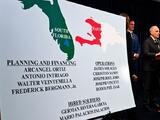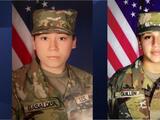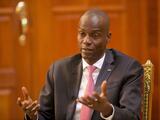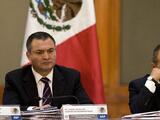Death of a Latino cadet: the police say he committed suicide but the family believes he was murdered
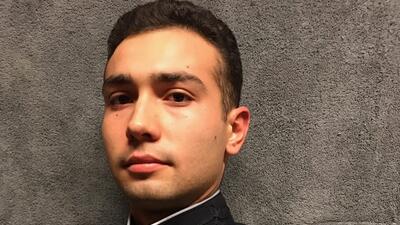
Alexander Bello-Ortiz was in his last year at a Florida aeronautical university and looking forward to joining the Air Force when a tragic – and mysterious – set of circumstances cut his life short, aged just 22.
The decorated Air Force cadet had just come back home from a morning on the beach trying out his newly refurbished surfboard in September 2020. Soon after, a single gunshot rang out from his bedroom in the house he shared with two fellow Air Force cadets in Daytona Beach. He was pronounced dead the next day from a bullet wound to the head.
Daytona Beach police quickly came to the conclusion that his death was suicide, based on lack of evidence of a struggle and the fact that the bullet entered his mouth, according to police records. Evidence from a home security camera also persuaded the police that Bello-Ortiz was “intoxicated” after consuming magic mushrooms.
A search of his phone revealed he had downloaded information about magic mushrooms.
Bello-Ortiz “was in a deranged state prior to the shooting … walking around the backyard in his underwear, talking to himself,” detective Jayson Wallace concluded in his police report on the case in late March 2021. The cadet “appeared to be in a hallucinatory state,” he added.
Bello-Ortiz’s grieving family adamantly reject the police conclusion, noting that a toxicology report found no presence in his blood or organs of psilocybin, the naturally occurring psychedelic drug found is some species of mushrooms. Bello-Ortiz was also a model student and cadet who was widely recognized for his positive personality and leadership skills.
The cadet appeared to have no suicide motive, and left no suicide note. He had no financial trouble, romantic entanglements, or problems with drugs. He was planning to make the four-hour drive later that day to Miami to spend Labor Day with his father and step-brother and step-sister.
Cadet of the Year
In fact, his student life - and future career – all appeared to be going exactly according to plan. He had recently been selected as his unit’s Morale Officer because of his extraordinary motivational leadership. Days before his death he was nominated by his superiors for the Non-Commissioned Officer Award, as Cadet of the Year.
“Alex was a shining star, whose brightness was extinguished all too soon,” subjecting his mother to an “unimaginable nightmare,” according to a wrongful death lawsuit filed by the family's attorneys in federal court in Orlando last September on the second anniversary of the shooting.
“One of the most tragic consequences of what happened was to cast shame on a man who was admired and respected by all who knew him,” the lawsuit stated.
"From being extremely sad, right now I am extremely angry. My life has been taken because Alex was my only son," Lourdes Ortiz, told Univision in an interview accompanied by her husband, former U.S. Marine, Harold Dolph. "We are demanding a full investigation so that everything comes to light," she added.
Ortiz wears a gold cross around her neck with her son's ashes sealed inside. "Alex has been my whole life. There is no greater pain in the world and it doesn't go away with time. I miss everything about him because he was the reason for my life, I don't know how to be anything other than Alex's mom."
Two competing narratives into Bello-Ortiz's death
The investigation into Bello-Ortiz’s death has turned into two competing narratives based on wildly different interpretations of the evidence, which includes video and forensically enhanced audio that captured the moment of the fatal gunshot.
After hiring a former detective to conduct a thorough investigation, the family alleges in the lawsuit that one of the cadets, John Burlein, shot Bello-Ortiz during a heated dispute and then covered up the crime with the help of his father and several other cadets.
The Burleins and the other cadets have all rejected the accusation of Bello-Ortiz’s family in court documents filed this month by Richard W. Smith, an Orlando lawyer representing them collectively.
When contacted by Univision Noticias, Smith declined to comment on the case.
Alex Bello-Ortiz: son of Bolivian immigrants
Bello-Ortiz’s mother, Lourdes Ortiz, was born in Santa Cruz, Bolivia and moved to the United States to study, giving birth to her only child in Fairfax, Virginia in 1998.
Her son expressed interest in the military from a young age, joining the Navy’s Sea Cadets when he was only eight years old.
He was an Eagle Scout in high school, before earning a full scholarship to Norwich University in Vermont as a cadet in the Air Force Reserve Officer Training Course. He studied electrical engineering and planned to work as a NASA engineer, dreaming of becoming as astronaut one day.
"Alex loved every type of mushroom you could cook," says his mother, who adds that he experimented with being a vegetarian for six months. He was so health-conscious that he wouldn't drink Coke or eat at MacDonalds, she said. "He would make the best eggs benedict with portobello mushrooms for breakfast," he added.
Bello-Ortiz moves to Daytona Beach
In September 2019, Bello-Ortiz transferred to Embry Riddle Aeronautical University in Daytona Beach, Florida, attracted by its strong engineering program.
To support their son, Bello-Ortiz’s parents bought a small home in Daytona Beach, a popular beach city on Florida’s east coast, famous for its car racing track and attracting students from across the nation during the annual Spring Break.
Bello-Ortiz spent the summer restoring the modest three-bedroom two-bathroom property, even building his own picture-perfect, white picket fence, cutting up, nailing and painting the wood himself.
But soon after taking in two roommates, both fellow cadets, the family says in the lawsuit “John Burlein began causing problems” related to drug use.
The day before the shooting, after an alleged dispute, the family says inhe lawsuit says Burlein hatched a plan to shoot his roommate with a Henry AR-7 rifle Bello had borrowed to go hunting.
The family’s lawsuit alleges that part of the conspiracy was captured in audio and video from home security cameras.
Enhanced audio from one of the outdoor cameras reveals a violent argument between Burlein and Bello that led to a physical confrontation, they claim. The family provided the camera footage to the Daytona Beach police.
Bello-Ortiz shooting: two forensic audios with differing outcomes
The police sent the audio to be enhanced by ROCIC, a Justice Department information sharing center in Nashville. It’s transcript of the enhanced version found that Bello-Ortiz mentioned “doing shrooms,” – shorthand for magic mushrooms. It says Bello was alone and muttering incoherently to himself, out of the presence of Burlein, who told police he was in another room.
“Did you do drugs?” Bello-Ortiz says to himself.
“Some,” he answers.
His next words are: “Bon voyage, Oh!” according to the police transcript. Then a gunshot is heard.
The Bello-Ortiz family sought out the services of a private company, Owen Forensic Services in New Jersey, which came back with a starkly different transcript. Instead, of “shrooms”, it found that Bello-Ortiz offered Burlein a “truce”. But the argument escalated.
In order to hear the conversation, the forensic audiologist had to contend with various noises. A techno song by Deadmau5 can be heard in the background. There are also aircraft and bird noises.
Bello-Ortiz tries to eject Burlein from the room, telling him to “get going.” Burlein threatens him: “I’ll hurt you,” he says.
A struggle ensues. Bello-Ortiz shouts: “Get off me!” Then he exclaims: “Whooaa!”
Just before the gunshot, Burlein says “Take it!”
Immediately after the shooting, Burlein failed to call the 911 emergency phone number for five minutes, instead calling his father, the lawsuit alleges.
The audio of their conversation on speaker phone was allegedly captured on the home security camera. It was also sent by the family to the forensic audiologist.
“Did you f***ing kill him?” Burlein’s father asks.
“I did,” replies John Burlein.
“What if he’s not dead?” his father asks.
“Alex is dead,” his son answers.
Burlein’s father also “directed John to reposition the gun and tell an accompanying story to make Alex’s shooting look like a suicide,” according to the lawsuit. In court documents, the lawyer for the Burleins denied this conversation took place or that they played any role in the death of Bello-Ortiz and alleged coverup.
It’s not known if the police also sent the alleged conversation for analysis. It is not mentioned in the police report.
Univision has viewed some of the security camera video as well as police Bodycam footage, police incident reports and medical records. While some of the evidence appears to cast doubt on the police conclusion, it remains hard to tell where the truth lies.
Univision has not heard either of the enhanced portions of audio containing the disputed language. The forensic laboratories for both the police and the family were contacted, but said they were not at liberty to discuss their work.
No mention of gun on 911-call
During an eight-minute 911-call, Burlein told the dispatcher that his roommate had “collapsed,” adding that blood was oozing from his nose and ears. He never mentioned seeing a gun to the operator and later told police officers that he was in another room and never heard the gunshot. Instead, Burlein said he heard a loud thump, what he thought was an object falling, and then opened the bedroom door to check on his roommate.
The family of Bello-Ortiz say they don’t understand how Burlien could have heard a thump, but not a far louder crack from a gunshot.
The family accuse Daytona Beach police of botching the investigation, including a series of irregularities that compromised the crime scene.
They also complain that the police refused to accept offers of new evidence discovered by a private detective hired by the family. The family showed Univision emails from the police declaring the case closed and declining to discuss it further.
A spokesperson for the Daytona Beach Police Department told Univision on Friday that the case was reopened a few months ago in response to new evidence supplied by the family. “The investigation is open. I don’t know what direction it is going in,” said the department’s information officer, Carrie McCallister.
When police arrived about half an hour after the shooting, they made no effort to cordon off the crime scene or separate the potential suspects, according to the family and police video. Burlein’s hands were not swabbed for gunshot residue. Bello-Ortiz’s hands were swabbed in the hospital, at the family’s insistence. The results came back negative, suggesting he did not fire the rifle.
While swabs were taken from the gun, the family alleges “they were never processed or analyzed for the shooter’s DNA.”
Burlein was not interviewed by police, on the day of the shooting or the following weeks, according to police records turned over to the family.
Instead, he gave a one-page statement, written while seated in the garden of the home, while police were still on the scene. In it, he described nothing unusual about the day, which included hanging a flag on a wall with Bello-Ortiz and doing some laundry. There were “no indicators of suicidal intent,” he wrote.
His best friend, Kyle Trenholm, a fellow cadet who arrived at the house soon after the shooting, confirmed that Bello-Ortiz had no personal issues. “He has never had any intention to harm himself,” he wrote. “Last time I saw Alex he was his normal self, nothing seemed wrong,” he added, referring to dinner at an Italian restaurant the night before.
Toxicology and the magic mushroom theory
The police landed on the theory that Bello-Ortiz was under the influence of mushrooms at the time of his death, even though no evidence of magic mushrooms were found in the house, according to police records turned over to the family.
His family say he had long been interested in edible mushrooms, which he grew and were a regular part of his diet.
The family’s lawyers point to two toxicology reports, one of the hospital and one from the Medical Examiner’s Office, which found no trace of mushrooms, or any other drugs. After his death, seven of Bello’s organs were successfully donated after being rigorously tested for evidence of substance abuse.
However, the Medical Examiner concluded the test results were unreliable. Instead, it stuck to the magic mushrooms theory, concluding: “given the decedent’s behaviors prior to the incident, it is possible that he may have been disassociated from reality.”
It added: “Criteria for assigning suicide as a manner of death does not need to include intent to die due to ones actions.”
That appears to run counter to the definition of suicide by the National Institute of Mental Health, which states: “suicide is defined as death caused by self-directed injurious behavior with intent to die as a result of the behavior.”
The Medical Examiner did find that the bullet entered Bello-Ortiz’s mouth before causing massive brain damage. But there was no gunshot residue, abrasions or burn marks on his lips or face, or inside his mouth.
"I can't imagine of a homicide case that was treated like this," the family's attorney in Miami, former U.S District Attorney, Kendall Coffey, told Univision. "To close a file when the medical evidence utterly overwhelms any theory of drugs being involved is unfathomable and an utimate cruelty to Alex's memory and to the family of Lourdes Ortiz," he added," he added.
Was clean up part of a cover-up?
Less than three hours after the shooting police left the scene, effectively turning it over to Bello-Ortiz’s roommates.
The family allege that Burlein’s father took charge of the cleanup operation while also making several phone calls to ensure his son would not be investigated.
“Joseph [Burlein] directed the group to use mops, bleach, buckets and trash bags to clean the scene and destroy any remaining evidence,” the lawsuit alleges.
Bello-Ortiz’s mother and step-father immediately flew to Florida from Virginia, arriving at the hospital hours after he had been admitted. But doctors told them that he was fatally injured and there was nothing that could be done for him.
He was officially declared dead the next day.
During the hours that he was in the hospital, over 300 hand-written messages were sent from his fellow cadets praying for his recovery.
At a moving memorial service a week later, students gave heartfelt testimonials in a video of what their friend meant to their lives.
"He would look out for you and seek you out if you were having a bad day and do everything in his power to make your day better,” one cadet said in the video. “He had an aura about him […] any time you were around him, all your anxieties and problems would melt away and you would have a better day,” he added.
Another described him as a “glue” of his unit, Detachment 157 with a “contagious positive attitude.”
Others commented: “this man is like a beacon of optimism. He's always in a good mood."
At the end of the service, Burlein was one of four cadets who handed a ceremonial triangular-folded U.S. flag to Lourdes Ortiz. A bugle played the traditional military farewell tribute, known as ‘Taps’. Burlein has since been commissioned as a Second Lieutenant in the Air Force Reserve, according to official military records.
In an official announcement, Embry-Riddle also posthumously awarded Bello-Ortiz his electrical engineering degree, cum laude.

